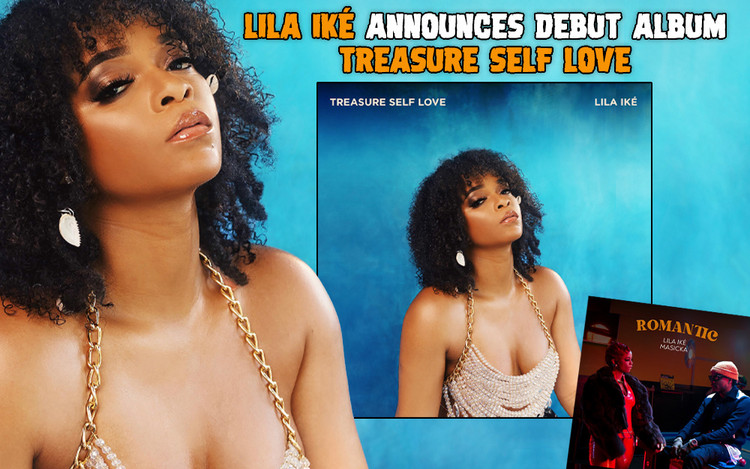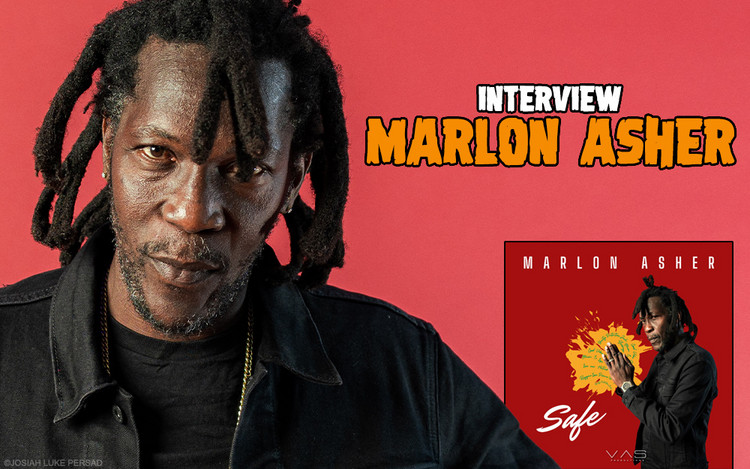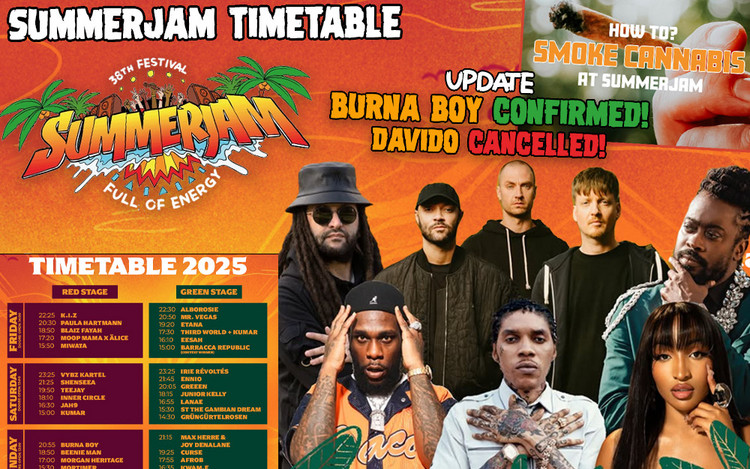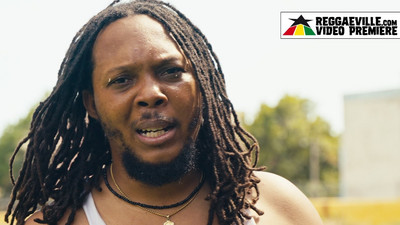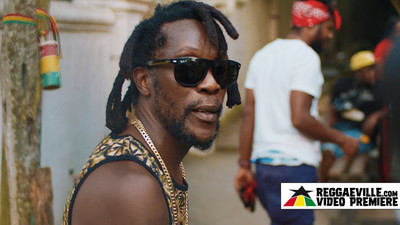Rocker T ADD
Interview with Rocker T
06/23/2016 by Justine Amadori Ketola
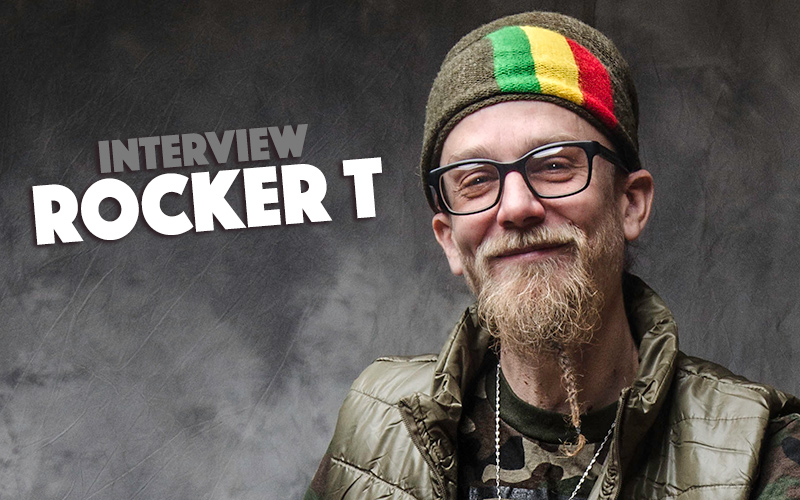
Rocker T is part of the first generation of American-born reggae artists. He set the trends mixing varied rhythms with toasting back in 90’s Brooklyn, New York establishing a soundsystem in an area that had the largest West Indian population of immigrants outside of the Caribbean. Reggaeville linked with him to discuss his new album Return of the Tru Ganjaman. He’s a marijuana advocate, a pacifist and a Rastafarian now living in Northern California.
Let’s go back to the block, let’s discuss the genesis of Rocker - T inna Brooklyn, dem time deh…How did this MC style start- you are a pioneer for many other non Jamaican artists- was it basically by absorbing your experience on the block, literally honing your craft outside the street corner or on the stoop?
That is how I started, I began tagging when I was young with a couple of friends of mine. And one of them started DJing, we were around 11 or 12. My friend was like ‘Imma get turntables and be a DJ’. And then someone had to make some lyrics and I’d been singing in choir and I’d been writing some songs thinking ‘I’m going to have a band some day.’ I was ten or something when I was like ‘I’m going to write a song.’ So he was like ‘You’re a singer so you have to’…it was kind of natural, he’s gonna be the DJ and I’m gonna do the rhymes and sing the hook. And so we began, our first performance ever was in a church community center, a youth group. So that was the first, where we are going to let people know that this is what we do. Then we started out on the street, as a crew, we would just dance and beatbox and just sing, rap, anything.
Once we started listening to more reggae, there’s a lot of music we listened to, punk, all kinds of different dance music, all kinds of different rock, just to find the breaks, to find the different beats that we could dance to or that we could do lyrics to. Some of us just really started to get into reggae and the more bass end of anything so if it was hip-hop or rock as long as it had a bass then it was cool with us. So funk music, R&B beats, and everything, Jazz anything like that, as long as it had good bass. We would challenge each other, just to be better lyrically. Like ‘Everybody write, freestyle eight bars right now,’ that kind of thing. It would be about your environment, cutting school, hanging out on a stoop somewhere and I particularly took to that. That’s why I am kind of ahead as we’re saying influencing people, because I was really influenced from a West Indian side, not just from an American music side.
During those times the music was evolving, hiphop evolved from the Jamaican community there in NYC and linking it up with other communities, can you talk about how you started Jah Warrior Shelter and what that meant at that time to have a sound system that was led by Americans- and not all of them Black or Jamaican or Jamericans?
It was a very intense time and we were strongly led to do that, we just loved the music so much. Its the real living of it, if you are living the music, you want to be able to provide it for the community, so that’s the whole even basis of why the soundsystems exist. Its a love life where the true soundsystems are not just focused on what we’re going to earn its about having a good party and making sure that everyone in the whole neighborhood is happy. By default, that connects to the world, in a world community. We were just so strongly into the music, we were encouraged by other DJs and other performers and producers cause they saw in us, just how deeply we feel about what we are doing. 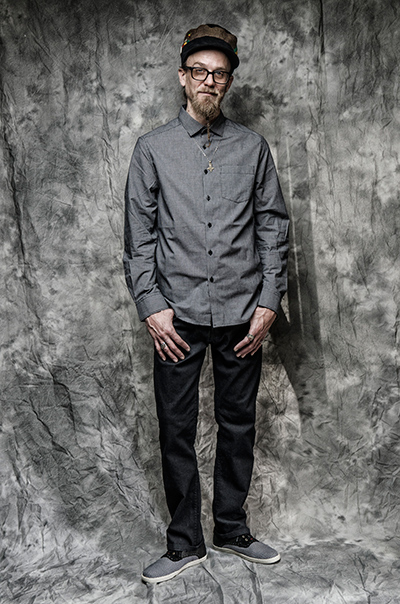 So even though there was a lot of people who maybe were not ready for it, or maybe we’re not supposed to be doing this, cause there was a lot of competition and fire thrown our way for not being this or not being that, trying to be this and trying to be that, but I can flow in and out of so many English accents. Patois to me is another language, I don’t see it, its not a slang, its not just an off shoot of English, its how we talk when we’re together. So that West Indian vibe of the soundsystem, that’s our goal to be doing that. So Jah Warrior starts very small as a group of friends just playing at some barbeques. Then it expands out into bigger places where people are like ‘What? You all are doing this? Me cyan believe you are doing this, you cyan be doing this.’ And we are like ‘Ya we do this for real.’ When the records were playing they’re like ‘You really do, you’re not just following. You know what the man is saying on the record?’ I am like ‘Ya I know what he’s saying, for real.’ So that just builds and builds and builds because we just love it so much. So for me, Hip-Hop and Reggae are not separate, any music is not separate in a genre. We’ll play anything as long as the people are enjoying themselves.
So even though there was a lot of people who maybe were not ready for it, or maybe we’re not supposed to be doing this, cause there was a lot of competition and fire thrown our way for not being this or not being that, trying to be this and trying to be that, but I can flow in and out of so many English accents. Patois to me is another language, I don’t see it, its not a slang, its not just an off shoot of English, its how we talk when we’re together. So that West Indian vibe of the soundsystem, that’s our goal to be doing that. So Jah Warrior starts very small as a group of friends just playing at some barbeques. Then it expands out into bigger places where people are like ‘What? You all are doing this? Me cyan believe you are doing this, you cyan be doing this.’ And we are like ‘Ya we do this for real.’ When the records were playing they’re like ‘You really do, you’re not just following. You know what the man is saying on the record?’ I am like ‘Ya I know what he’s saying, for real.’ So that just builds and builds and builds because we just love it so much. So for me, Hip-Hop and Reggae are not separate, any music is not separate in a genre. We’ll play anything as long as the people are enjoying themselves.
In those times it seemed that artists like KRS 1 were evolving in hip hop and they actually used reggae and patois in songs to help bring forth what you were doing, this cross cultural expression, livity, positive messages its fair to say with your band Skadanks that era was the predecessor to these times when we have Assassin and Popcaan in hip hop songs.
We were very much ahead and there are songs we made then that I hear about now. People didn’t even tell me then that they liked it or they heard it then. They are like ‘I heard this track that you did then’, what was it like 20 years ago. And they are like ‘But we like it now.’ It’s beautiful, you’re thinking, ‘aw man, they are not feeling us, they’re not getting it, its too different or its too cultural.’ Its breaking down too much racism, people aren’t ready for it yet. Cause Rocker T is supposed to be in this box cause you look like this and you’re supposed to talk like this. KRS you’re supposed to be in this box cause you look like this and you talk like this. We’re like ‘What box?’.
In 1991 the Whole World Africa is the album that KRS One produced, then the track with Jamalski, in 1993 Put It On. Those are like early pure Raggamuffin Hip-Hop. We’re looking at 20 years since Tru Ganjaman in 1996 and hence the return of the Tru Ganjaman.
Yes I, 20th anniversary, figured I’d do it up big right?
Looking at the lyrics on these songs, in particular Man A Warrior, you point out that you were on the battlefield, on the front lines, you bruk down fence and barriers- you point out that you are a leader, not a follower not a guy not a dude. Its a reflection on where you are now, in California, not on the same streets but in the current landscape, listening to the next generation, but its also a reflection on what you may have faced in the beginning, before there were so many Anglo-American and non-Jamaican reggae artists and bands.
Can you discuss what those barriers you broke and how your crew were pioneers in this sense too?
I really think the basic component was that, in general there are people that genuinely in their heart are like ‘We don’t want this to be a racist program. We don’t want to live in a world where the people are visually different from each other are at odds with each other.’ So that is in the heart of the people who go into these actions in the first place. So its important to find those other people. Whether you find them by choice or you happen to find them. In my case often it was they found me or I just happened to find them and realized we are looking for the same thing in life. That music itself will break down these social barriers also, how rich people shun poor people. That’s not necessary that whole system is not necessary. The same with women and men the way that they pit themselves against each other. Also the racial situation of the world. Music being such a key tool in either propagating separation values or let’s break down these walls. Reggae music particularly it seems, to people like myself that’s what it appears in this earth to do, is to break down these walls between us. So by us, even by my older crew, the first Sound System I worked for before Jah Warrior Shelter I am a part of Eruption Hi-Power. They are fully West Indian born and moved to Brooklyn crew. They were the ones that…that is why I say ‘On the battlefield, I don’t shoot a glock on the battlefield, I’d rather play the Chronixx, the Protoje and the Kabaka (Pyramid). I say that to put it in context today, but its true that I am referencing earlier experience as well that I wasn’t encouraged by gangsters that I grew up with to sell drugs or shoot guns. They told me ‘Don’t do what we do, we want you to sing on the mic, we already done this, we already did this, we got the block on lock, why don’t you get up on the mic now, we don’t want you to be in trouble, we don’t want you causing trouble. We want you bringing peace and happiness into the world.’
That’s where that experience really comes from, cause there are people that are coming up at me racially, ‘get off the stage, you can’t talk like that, you can’t sing like that.’ And there’s a man right next to him that says, ‘Nah man, the man is Jamaican leave him alone. He’s Jamaican to me, I don’t care what you say.’ So those are those very fire, rebel times, but its still going on and we’re still doing that work. We’re still I think from Frank Sinatra, to Sammy Davis Jr., MC’s who are quintessential at what they are doing, are attempting to bring the world together, and to break down these walls. So I’m out there for real, on the block and the police, and the gangsters and I’m not armed and I’m doing that work and that’s why I’m talking about it that way, I’m not following this, I’m leading this away from that.
The horns on that tune with the tuba/coronet sound its very original, but you were always playing with vintage sounds in your production, Ska and Rocksteady influences that original toasting style,you are into cultural preservation in a way too.
My crew the Rockers crew the Skadanks crew the Brooklyn Rocksteady Crew all the Stubborn Records family, we love original Jamaican music so much, that we’ll spend crazy amounts of money just to have one 7inch that we get to hear ever in our life, just to put in our collection, to play it in the dance. So we’ll always represent for the way its first made, its important to keep teaching, all of this bass music is coming from an older foundation of music from South America from the Caribbean, from Central America, from Cumbia from Ska and from Reggae. All the bass/soundsystem idea, all the big party raves, with the wall of speakers, all that comes from that culture. So we feel that its important to preserve the roots of that. So we always represent and make music like that. But we have to move into the future, we have to evolve with music as well. Music is not to stagnate. I think on the album that is shown clearly too, cause there’s rootsy songs, there’s electronic songs, there’s remixes. I’m always attempting to bridge the musical gap. I don’t want the record store to be divided in genre. I grew up when the record stores were A,B,D,E,F, I thought all the music was just in alphabetical order, no matter what type of music you want. It wasn’t split up into sections, I’d like that to be more the case again.
You have remixed/ adapted these songs from the 90s to modern EDM vibes, what inspired you do this, what you have basically summed up. You have witnessed the evolution of music, the birth of hip hop, the growth of dancehall worldwide, the Major Lazer phenomenon, is that part of what drives you to do these type of EDM versions?
I have been waiting a long time for this to be popular in America, to be perfectly honest. I lived in Amsterdam for some time, I’ve come and gone from Amsterdam for fifteen years, and toured in Europe. I’m good friends with Perch and Zion Train (UK soundsystem) I just think they are dub masters. I’ve listened to other crews like Jah Shaka, and its just amazing and Congo Natty and Junglist. When Jungle started in the late to mid 80’s, most people never even heard it til the mid 90’s in America. And I was like ‘This is where reggae is going, this is the evolution of our music.’ I was so excited. The same with the Skadanks record, we’re 20 years ahead of diggin’ stuff and Adrian Sherwood and African Head Charge. I’m like ‘amazing’ and people are like ‘this is the wierdest music we have ever heard Rocker T, don’t DJ this please. Put that dub record back on.’ I go over to Europe and I’m like ‘man everyone loves this over here.’ We go down to Mexico and ‘they love it over here.’ So now, they love it here, so I am like ‘Let’s go, gates open’. It is very inspiring also the rhythming I love these new sounds. There’s so many crews and so many artists and producers that I rate in different forms that make different types of bass and things and I think its really great, cause I think that it does bring together people that weren’t together before. Before the electronic scene and the dancehall scene were very separated. But now you can’t have an electric rave without dancehall vibes. Even if its just the vocals on the beats.
In Europe you had the dancehall vocals on the EDM tracks.
In America it has still been kind of separate, cause I found that trying to book gigs, ‘Oh we have this new bass group and I want to bring in this artist.’ And they were like ‘Is it going to be a reggae party or is it going to be a dance party?’ I would be like ‘No we’re trying to do both.’ Now you can, people don’t need you to explain that any more. ‘Oh DJs and great music and live artists, great.’ I think it’s a beautiful time.
The lead track Yankee and Yardee has such deep patois, “a who dis” literally from the perspective of the listener/native patois speaker, as in how can this be a non-Jamaican- or a white person - as a patois speaker me say large up. Do you find yourself thinking in patois?
Yes, I dream in patois, I even talk to myself in patois. I’m born and raised in Brooklyn (NY), so I have many ways of speaking English. I can speak what I call ‘foreigners’ English, how people speak English in different accents. The are from this country and they speak English this way, and I can join right in with them and they understand everything I say so perfectly, its great. With the patois and really more Brooklyn talking which you hear in my accent on a normal day-to-day basis as well, is because that’s how I grow up, is really talking like that. I mean in a really heavy Brooklyn place and everyone’s from Brooklyn, and like ‘Yo we’re from Brooklyn.’ Or I’m in a West Indian neighborhood and everyone is just hailing each other up. You know, if you don’t talk like this you can’t understand. Its not about, you have to talk like this so other people like you, its like if you don’t talk like this, you can’t think like this. So you have to talk like this in order to understand what people are saying.
Its the linguistics, the cognitive meaning behind the words, its how people feel a part of the conversation.
Ya real talk…Family we were blessed, we were poor, I grew up very poor, but my father worked for Pan Am airlines which had a policy of letting any employee go anywhere on standby. So if the plane had seats you could go on it, so we would just go to the airport, with no money and be like, ‘We’re going somewhere for a day.’ I was very blessed that my parents took me to Jamaica when I was three and to almost every island in the Caribbean I’ve been to at least once. Before I’m even ten years old. I was never a child who was like, ‘Mommy what are they saying?’ I was never that person.
‘Hey I don’t understand what everyone’s saying, they talk funny.’ Never, from I went to any place, from I went to Jamaica and they say ‘How ya doing my man, wha ya say?’ I would say ‘Oh I am fine.’ I always comprehended so I give thanks that my parents, even in our poverty were able to really internationalize. That’s why I’m so like….racism is so not cool. So when people are like, ‘you are a fakin’ Jamaican’ I’m like, ‘No man I grew up like this. How can I say I’m this and I’m that when you don’t even know the person’s character and upbringing and why I speak in this language and why I think in this language and why I write lyrics in this, what people call slang, bad English, actually expands your mind.
You’ve collaborated with several artists near and far, as well as collaborated on this with a few producer crews, Royal Order, I-Vier your partner in Jah Warrior Shelter, Dynasty and several others on the remixes.
Yes the song Man A Warrior, that was produced by DJ Prophecy who passed away recently. I didn’t even know if that track was recoverable, we had never finished it and I pieced it together, I had to recreate that track, out of searching through the original vocal session I had recorded and sent to him. All I had was the two-track of what he had sent me to voice on, I just had the beat. He had already mixed the beat fortunately and then he passed away. We were communicating off and on, ‘I’m getting the lyrics to you can you get me the BPM cause I want to do an edit, I need to fix the vocals a little bit. I never sent him the new folder, I never got the BPM from him, he was going through a lot and it was just tricky to communicate with him and then he moved forward. I was like ‘If there’s any way that I can find this and put this together. I don’t care if I have to stay awake for days with this.' I’m pretty happy about that.
It really is a powerful song, I think different producers bring out different parts and allow you to be comfortable on the rhythm when you have these collaborations that are sometimes not done in person across the internet.
As far as the Medicine, marijuana, there are quite a few tunes with this theme of the album is the Return of the Ganjaman with songs like Herbalist, Chillum, Garden of Goodness, what do you see as the future for cannabis freedom, in the Bay Area and in Oakland with Oaktown University and the medical movement that is so vital and vibrant, do you think that the ballot in November will hold legislation that may be beneficial? What might your potential excitement or concerns be about legalization in California?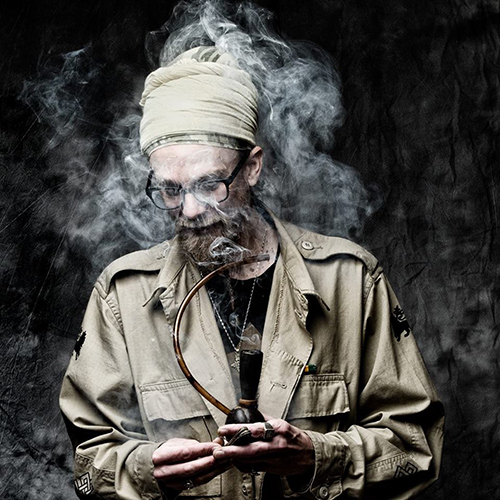 I am very excited and looking forward to things to come. I am also concerned of the Marlboro factor, and so you know that this company is patenting the name of some strains. I know from being active in the movement, outspoken in the movement and doing things publicly for this to become decriminalized, that’s always been my goal, to decriminalize, not to turn it into alcohol and cigarettes, but to let it stay as someone’s back yard medicine, just like your mint plant, that’s my feeling. In cultural, community, societal hands, on a normal, regular basis, we live in a society where people pop pills and drink at school or at home. You are not going to say, ‘They are acting crazy on marijuana’. But on herb no, you are not going to tell me that is the deal, so I want that decriminalized. My concerns are where we can see, where we were, where we’re going to go to jail, we’re on the front lines walking down 5th Avenue, long before any medical laws exist anywhere in America, and we’re coming down Broadway and 5th Avenue going to Washington Square Park going ‘arrest us if you want, this is the people’s herb and we’re going to have it.’ Then to turn to now, its safe, let’s jump in there, and make a bunch of money and we don’t even have to be cultural about this and we don’t even have to love the plant, we can just cash in as well. But I think there’s enough people who built this movement, and who are the foundation all the way from the ’30’s with Pinnacle, and Rasta saying ‘this is our culture, this is our commerce, this is our community, you are not going to tell us that we’re drug dealers or selling and smuggling, cause this is for the benefit of the Earth and we’re going to base our society on music, culture and good food so that’s one of those is herb.’ So if you’re going to have healthy medicine, clean food, it all comes from this type of thinking. So I think that will still carry the day, eventually.
I am very excited and looking forward to things to come. I am also concerned of the Marlboro factor, and so you know that this company is patenting the name of some strains. I know from being active in the movement, outspoken in the movement and doing things publicly for this to become decriminalized, that’s always been my goal, to decriminalize, not to turn it into alcohol and cigarettes, but to let it stay as someone’s back yard medicine, just like your mint plant, that’s my feeling. In cultural, community, societal hands, on a normal, regular basis, we live in a society where people pop pills and drink at school or at home. You are not going to say, ‘They are acting crazy on marijuana’. But on herb no, you are not going to tell me that is the deal, so I want that decriminalized. My concerns are where we can see, where we were, where we’re going to go to jail, we’re on the front lines walking down 5th Avenue, long before any medical laws exist anywhere in America, and we’re coming down Broadway and 5th Avenue going to Washington Square Park going ‘arrest us if you want, this is the people’s herb and we’re going to have it.’ Then to turn to now, its safe, let’s jump in there, and make a bunch of money and we don’t even have to be cultural about this and we don’t even have to love the plant, we can just cash in as well. But I think there’s enough people who built this movement, and who are the foundation all the way from the ’30’s with Pinnacle, and Rasta saying ‘this is our culture, this is our commerce, this is our community, you are not going to tell us that we’re drug dealers or selling and smuggling, cause this is for the benefit of the Earth and we’re going to base our society on music, culture and good food so that’s one of those is herb.’ So if you’re going to have healthy medicine, clean food, it all comes from this type of thinking. So I think that will still carry the day, eventually.
That’s my feeling we can’t get to the point where its illegal to grow your own tobacco you have to have all these permits, I don’t think its going to get to that point, cause the movement is deeper than that. You didn’t have a movement of people so organized when tobacco laws were made, now its different. They took away the medicinal rights to people with tobacco, they took away people’s rights to grow it and things like that. But I don’t think that can completely happen, cause we learn from these things, so we should do better this time around. I see the safety and joy of it and the profits that a company like that will bring, what can you do to stop that? At the same time, we have a deeper foundation we have a stronger foundation internationally that its medicine, and that’s a musical communication tool, its a vibrational communication tool,its a sacred transmitter, you know? Even tobacco has laws made back to protect it. If you’re a certain person, you can do that, without having to be a company and whatever. It’s not for everyone but that was still progress, even, it went so far backwards, but then there was progress with peyote church and things like that.
As someone who practices mindfulness, do you find your spiritual journey is informed by Rastafari or would you say it is just a part of it and that your livity as a rastaman - is more of a humanitarian and humanist rather than an orthodoxy or do you consider yourself part of one of the houses of Rastafari as in Bobo Shanti, Nyabinghi, Twelve Tribes, Orthodox.
I’m trained and raised, in terms of the Rastas that are my teachers and my elders by mostly Nyabinghi theocracy and at the same time, have had a lot of building and training and growing with Bobo and consider myself both and also due to what my elders taught me, consider myself beyond that and not as in saying leave it behind, as in, its deeper than that and that Rasta should evolve from any factionalized system and that to study Haile Selassie’s teachings, as Haile Selassie’s teachings, regardless of camp or house was what my elders taught me to do in that sense. I have other elders…raised by my Christian family and I have elders from that. I’ve grown up in New York so we all grow up with martial artists and with Buddhists, so I have elders in that world. But they connect with this Rasta vibe, its very interesting to me that all of my elders have encouraged me to keep the Rastafari music going out there to the kids. Even the Shiva elders that I know, even heavy Muslim elders that I know are like ‘you keep doing what you’re doing, because the same way the reggae got to you, that’s how it gets to the kids. In Hip-hop or in the Rasta frame or in an African love frame or in a peace-love-having-fun unity worldwide, having that energy that’s doing the right thing.
You could call it Rastafari, you could call it beyond that, you can call it other things, its still the same thing. So I’m a human being, prior to anything, I chose to come here I give thanks that my parents get me here cause that’s what we forget sometimes, regardless if we get along with them or not. Thank you that you got me here alive, cause that’s what they have to do. You don’t necessarily pick, we might be picking them I think, in the scheme of what I know. We’re choosing to come down through and be here and we have the choice to be here and we want to do works we want to do something while we’re here, that’s why we chose to be here. They have to help us survive long enough to figure out whatever it is we are trying to do you know? So all our elders all our teachers, that’s what is the total of what my scope I would say as far I’m taught and advised. Then sometimes I still as an individual we have to make choices and so I see it as a worldwide movement of youth and I’ve seen the effect even in school, of when we talk about the things that are left out of school and so much of what Rasta even comes from originally and things that happened even 2000 years ago, 3000 years ago, 30,000 years ago things that are predicted, that this is going to go down, that these people are going to be here, for your benefit to tell you certain things so you don’t mess it all up. So I think that that’s important for us to pay attention to and to not allow the systems that be to keep these teachings out of the youths minds like, why wait til you’re sixteen to hear it, why wait til you’re 21 to hear it. By the time you get to college and they told about something they told you about when you’re seven. We’ve learned all these bad habits and societal walls and we have all these barriers between each other and people go to college and get taught much more higher minded things and they have to pay for it, all this stuff. I’d like these things to be in public school system from early on.
These teachings of disarmament, these teachings of non-alignment, instead of allies and enemies and countries, no alignment. Everyone just stepping up for the rights of each citizen of the Earth. Its very deep teachings about how the Earth could run better are left out. I can’t say that I’m orthodox except in the sense of I’m an orthodox Rastaman, based on how deep I study the actual person: Rastafari. How orthodox is a person in any sense, is it dogma is it making a wall or is it helping people to be more peaceful and kind to each other. So either way is fine to me as long as the result is more peaceful and kind.
In addition to being part of the changes on the creative side and evolution in the music industry, you have also worked within the major label system with a record contract with Elektra. What do you see as the advantage that today’s DIY type of marketplace offers as well as the current technologies available. Or in the converse, what do you see as disadvantages?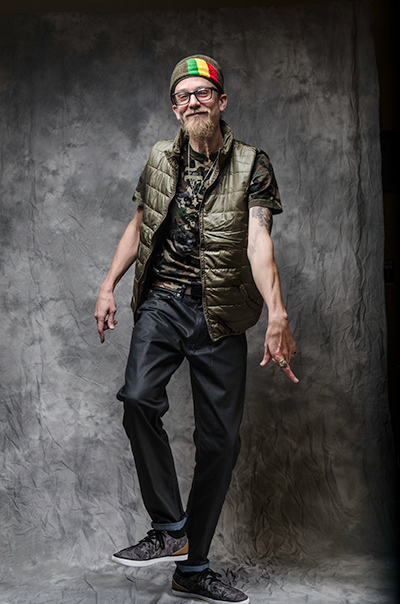 The advantage is clear with being able to record, being able to play it for someone else, create and share, is different because it used to be so difficult to do it unless you had the equipment yourself, as in tape machines and mixing boards and racks of gear and we’re talking about into the hundreds of thousands. You had to have free time, or you had to work for it, if you didn’t have the money you had to deal with ‘We ran out of hours, but we need two more hours.’ So that is definitely way different because so much can be done outside of that world and you don’t run out of money and you don’t run out of time. It was only for certain bands and it was for certain artists is the thing. Because true even though it was good, it was only cause if you were doing good. Even in those days, if you were on the outs with the company or if the people suddenly didn’t think you were so great anymore, it wasn’t so enjoyable. But there was a side of it that was enjoyable in terms of getting provided for so you could create.
The advantage is clear with being able to record, being able to play it for someone else, create and share, is different because it used to be so difficult to do it unless you had the equipment yourself, as in tape machines and mixing boards and racks of gear and we’re talking about into the hundreds of thousands. You had to have free time, or you had to work for it, if you didn’t have the money you had to deal with ‘We ran out of hours, but we need two more hours.’ So that is definitely way different because so much can be done outside of that world and you don’t run out of money and you don’t run out of time. It was only for certain bands and it was for certain artists is the thing. Because true even though it was good, it was only cause if you were doing good. Even in those days, if you were on the outs with the company or if the people suddenly didn’t think you were so great anymore, it wasn’t so enjoyable. But there was a side of it that was enjoyable in terms of getting provided for so you could create.
We were given accounts or budgets or expense- ‘Just go in there and make music, we’ll pay for it.’ You have to pay us back but its not like if the record doesn’t pay us back, we just write it off our taxes. We don’t actually make you pay it back out of your pocket, we just own the record and until we get our money back, you don’t get a penny. So even though that sounds like its cutthroat or its tough but if you have no access to this, its kind of a great thing, we get to make these awesome records, we get to go in these awesome studios, and then ‘look, this one actually sold, we got our royalty checks, they got their money back, hey…they want to do it again now, they love us.’ So it doesn’t seem like labels can actually pull those kind of strings the way they used to, they do seem to play that game somehow where why should they even bother because they are throwing all this money into the wind, almost to be more popular than each other, they are not really being profitable. They are not really selling what they say they are selling, they are not getting physical sales like they used. They are claiming a million downloads but they say it was a million but actually 20,000 were paid for and 800-900 thousand were free downloads that they gave away. So they are just kind of keeping themselves in the picture, they are all kind of sink or swim and trying to swim instead of sink. But its more in favor of smaller companies with less operating costs who have promotional avenues.
So you have like Gangnam Style is a perfect example. But that dude has been at it a long time, he’s not just showing up, he’s not a young boy in the pop scene which is what most of the people that when they first hit they are very young, and they only have a career until they get to a certain age. He’s hitting after that age, really because of a gimmick and you know a vibe and able to get a really good video filmed of it, out of his own pocket kind of thing. That kind of vibe, where you pull some stuff off, in this DIY world, that’s a perfect example of, he didn’t need a big label, to make that happen at all. I think its better, there’s more people that will say, ‘It’s all flooded and there is more competition, there’s so much bad music, but everyone’s just expressing themselves which I think is cool. People are talking to each other all over the world with music now. Isn’t that what real musicians wanted? There can be some support that some philanthropist musician people that don’t have the talent, should still be investing in artists. Take the money away from school, don’t take the money away from giving grants to artists, or just personal philanthropy, ‘Hey you’re a dope artist, I’m a rich person, I’ve got money, here make some dope music, what’s wrong with that?’ Cause that’s how the labels used to treat the artists so that’s what people maybe can step up and be like that with artists.
You have performed on many of the world’s most prestigious stages, you had a residency at the Wetlands in NY, played Cannabis Cup in Amsterdam, performed in Jamaica. What are some of your favorite live performances over the years?
There are moments in general, I don’t even remember where I was, throughout times of performing where everyone there, we were just all somehow in a whole one thing. Its hard to totally explain. I opened for Lee “Scratch” Perry in New York and that was pretty epic, at the Irving Plaza. I have moments where people have told me I am just glowing and seem to be having an experience that is intense and other people tell me they see this glow. Those are the moments, this is what music is for, not to pit boy against boy, to encourage shooting each other in the street. Music is for mass healing, enlightenment and joy, and fun and everyone leaves going, ‘Wow I can’t even explain what I just experienced.’ Those moments confirm that. That’s why when I’m starving, I don’t even know if I’m going to get evicted sometimes, this is what I do.
What does 2016 have in store for you for performances, you are going to be on Reggae on the River this summer in Humboldt County in Northern California, where else do you plan to celebrate your 30 years in the business?
I’m going to be at Sierra Nevada World Music Festival, in the dancehall, Jah Warrior Shelter will be there. Also at Reggae on the River, and at the Emerald Oaks Campout, two hours east of Santa Cruz near a town called Gonzales. I’ll be at Sacred Movement and there are more dates to be confirmed.
Any parting comments for the Reggaeville massive?
I’m just so thankful, for this opportunity to speak, and I know I speak for many people who don’t have a voice. So when I get a chance, I say I but I am talking for a we and an us and an I and I. I’m just very thankful and glad to be a part of our community and our world and to be interviewed by Reggaeville is just incredible. It makes so many people happy, all my teachers and everyone are just waiting, they say ‘When they give you a chance to talk, you say the right thing.’ So it’s humbling and its really joyful. I just want to big up the whole massive, because I feel that Reggaeville has really helped everyone whose trying to connect. You’ve got DJs in Slovenia that are like ‘Come on my sound.’
PHOTOS BY LEE ABEL




